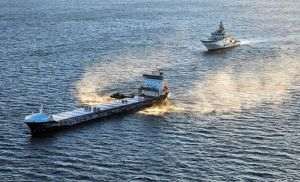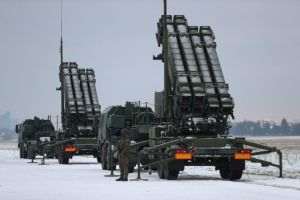The law of retaliation (an eye for an eye and a tooth for a tooth) seems to dominate the conduct of the two main powers in conflict in the Middle East. Both the authorities in Tehran, which ordered 180 ballistic missiles to be sent to Israel on Tuesday night, and those in Tel Aviv, which are preparing an appropriate, proportionate response, appear unwilling to make any concessions regarding their right to use their own weapons as they wish, at the risk of serious consequences for the population of the two states.
Immediately after the massive attack on Israel, Prime Minister Benjamin Netanyahu said, quoted by The Jerusalem Post: "Iran made a big mistake tonight - and they will pay for it. The regime in Tehran does not understand our determination to defend ourselves and demand a price from our enemies. We will respect the rule we have established: whoever attacks us, we will attack him. (...) This is true wherever we fight the axis of evil. It is true in Judea and Samaria. It is true in Gaza, Lebanon, Yemen and Syria - and it is also true in Iran. We are fighting the axis of evil everywhere, including southern Lebanon and Gaza. Today, more than ever, the forces of light in the world must unite and work together against the dark regime of the Ayatollahs, which is the source of terror and evil in our region. They must stand with Israel. The choice has never been clearer: between tyranny and freedom."
Instead, the authorities in Tehran warn that they will respond more harshly if Israel attacks Iranian territory. Mohammad Hossein Bagheri, the Chief of Staff of the Iranian Armed Forces, said, according to the Mehr news agency: "If the Zionist regime, which has reached the height of its madness, is not controlled by the United States and Europe and wants to continue such crimes or takes action against our sovereignty and territorial integrity, tonight's operation will be repeated on a larger scale and we will hit all his infrastructures."
As it can be seen, none of the parties in the conflict seem willing to give in or sit down at the dialogue table to find a peaceful solution to the conflict, which in the opinion of the majority of the world's states is the simultaneous existence of the two states in almost 60 years of conflict: Israel and Palestine. According to some Israeli officials quoted by the American websites Axios and Zerohedge, but also by the Jerusalem Post, it seems that among the possible targets of Israel's revenge for the missile attack by Iran would be Iranian refineries and oil installations.
Zerohedge points out: "Coincidentally, famous military strategist Edward Luttwak suggested a target earlier this week. Luttwak said: "Israel should hit Iran where it hurts." In a post on Unherd, Luttwak suggested that Israel strike Iran's Khark (Kharg) oil terminal. Iran currently pays a staggering array of foreign military expenditures in US dollars and not rials. Beyond the maintenance of foreign allies, starting with Hezbollah, there are imported components and supplies consumed by the domestic Revolutionary Guards, with its 125,000 soldiers and Iranian navy. This also includes imports of missiles and missile components from China and North Korea, as well as the foreign exchange costs of the entire nuclear program which is being carried out on a very large scale. In practice, most of this cash comes from a single source: oil. It is true that Iranian farmers grow pistachios and other exportable crops and that there are some manufacturing exports, even if the famous Tabriz carpets are out of date. However, according to official data for 2023, oil accounted for 83% of Iran's exports. (...) In other words, the flow of dollars that supports Israel's enemies, and that has caused so much trouble for Western interests from the Syrian desert to the Red Sea, emanates almost entirely from oil loaded into tanks at the export terminal on Khark Island, a patch of land located about 25 kilometers off the southern coast of Iran. Benjamin Netanyahu warned in his recent speech at the UN General Assembly that Israel's "long arm" could reach them as well. Indeed, Khark's location in the Persian Gulf is relatively close, 1,516 kilometers from Israel's main airbase. It is actually much closer to the Houthis' main oil import terminal at Hodeidah in Yemen - a place that was destroyed by Israeli jets in July and attacked again in recent days."
We will see in the next period whether Israel implements the suggestion of strategist Edward Luttwak or will attack several objectives of vital interest to the authorities in Tehran.
The situation in the Middle East is volatile and we invite you to learn more many of the other articles in today's edition of BURSA Newspaper.





















































